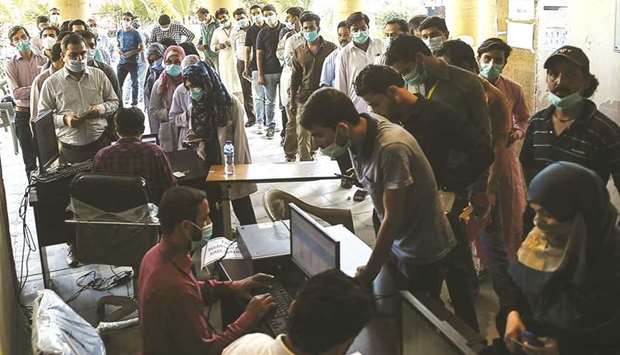Pakistan, Nigeria and Indonesia will be among the biggest recipients of free coronavirus (Covid-19) vaccines before June – more than 10mn doses each – the Covax scheme announced yesterday.
Some 238.2mn doses will be distributed around the world by the end of May, in a major acceleration of the programme aimed at boosting access to coronavirus jabs in poorer nations.
Though vaccination campaigns have gathered pace globally, the majority of injections have been administered in wealthier countries while many nations have yet to receive a single dose.
However, the World Health Organisation (WHO) – a co-leader of the Covax programme – says that providing vaccines to all countries is the only way out of the pandemic.
The Covax scheme, which is aimed ensuring equitable access to Covid-19 vaccines, outlined yesterday delivery plans for hundreds of millions of doses.
The five biggest confirmed recipients are Pakistan (14,640,000), Nigeria (13,656,000), Indonesia (11,704,800), Bangladesh (10,908,000) and Brazil (9,122,400).
They are followed by Ethiopia (7,620,000), the Democratic Republic of the Congo (DR Congo, 5,928,000), Mexico (5,532,000), Egypt (4,389,600) and Vietnam (4,176,000).
Iran, Myanmar, Kenya and Uganda are also in line for more than 3mn doses each.
Overall by the end of May, India is likely to be the biggest recipient of Covax doses, but its allocation was not finalised before yesterday’s distribution list publication.
The Pacific island nation of Tuvalu is meanwhile set to receive the smallest number of doses at 4,800, followed by Nauru and Monaco with 7,200 each.
Covax is co-led by the WHO, the Gavi vaccine alliance, and the Coalition for Epidemic Preparedness Innovations.
“Our goal is to protect as many people as possible,” said Gavi chief executive Seth Berkley. “Covax’s mission is to help end the acute phase of the pandemic as soon as possible.”
“It can’t be emphasised enough that we are undertaking the largest and most complex vaccine rollout in history,” he added. “We are just starting, but we should see more and more countries being served in coming weeks and months including those at all income levels and across the world.”
Hailing the campaign as an “unprecedented partnership”, WHO Director-General Tedros Adhanom Ghebreyesus said: “This is an unprecedented partnership that will not only change the course of the pandemic but also change the way the world responds to future health emergencies.”
The deliveries are made up of some 237mn doses of the AstraZeneca/Oxford vaccine, being manufactured in India and South Korea, and another 1.2mn doses of the Pfizer/BioNTech vaccine, which requires special ultra-cold storage.
The timeline for the delivery of the doses made by AstraZeneca and by India’s Serum Institute will be split into separate two-month schedules, Covax said in a statement, with the first in February-March and the second in April-May.
“These timelines are dependent on a variety of factors including national regulatory requirements, availability of supply, and fulfilment of other criteria such as validated national deployment and vaccination plans,” the statement said.
The Covax scheme is aiming to distribute enough doses to vaccinate up to 27% of the population in the 92 poorest participating economies by the end of the year.

Health workers queue for the Chinese-made Sinopharm Covid-19 vaccine, at a vaccination centre in Karachi.
